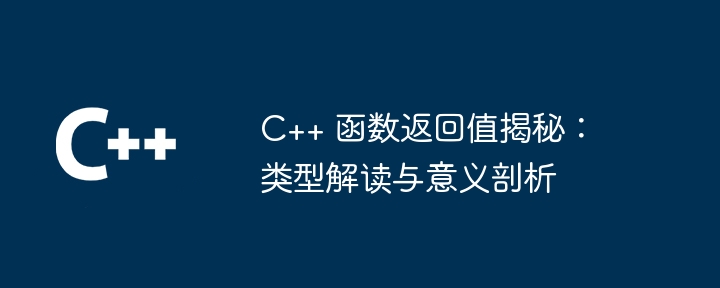
C The type of function return value specifies the data type returned and conveys the meaning of the function function. For example, a null value indicates that the function does not return any value. The success or failure status is expressed by an integer or Boolean. The specified result indicates the function operation. actual return value. Common return value types include built-in types (integers, decimals, etc.), pointer types (pointing to memory locations), reference types (aliases of variables or objects), and class types (user-defined data types). Through practical cases (summation function, email address verification function), we understood the application of different return value types in different functions.

C function return value revealed: type interpretation and meaning analysis
Introduction
In C programming, the return value of a function is crucial. It provides a way to obtain results or information from the function. This article will delve into the return value type of C functions, analyze its meaning, and deepen understanding through practical cases.
Return value type
The return value type of a function specifies the data type of the value returned by the function. It can be a built-in type (such as int, float) or a custom type. The following are some common return value types:
Return value meaning
The return value type of a function not only specifies the data type returned, but also conveys important information about the function's functionality. Common meanings are as follows:
void type indicates that the function does not return any value. bool) indicates whether the function execution is successful. For example, 0 indicates success and -1 indicates failure. int returned in the sum function is the sum of two numbers. Practical case
Function to find the sum of two numbers:
int sum(int a, int b) {
return a + b;
}This function returns two The sum of integers, of type int, indicates that the function executes successfully and returns an int result.
Function to verify email address:
bool is_valid_email(string email) {
regex pattern(R"([a-zA-Z0-9._%+-]+@[a-zA-Z0-9.-]+\.[a-zA-Z]{2,})");
return regex_match(email, pattern);
}This function returns a bool value indicating whether the email address is valid. true means valid, false means invalid.
Conclusion
The return value type of a C function not only defines the data type returned, but also conveys important meaning about the function's functionality. Understanding these types and using them correctly is key to writing efficient, meaningful C code.
The above is the detailed content of C++ function return value revealed: type interpretation and meaning analysis. For more information, please follow other related articles on the PHP Chinese website!
 What is the return value of the function
What is the return value of the function
 What are the differences between c++ and c language
What are the differences between c++ and c language
 Recommended learning order for c++ and python
Recommended learning order for c++ and python
 Cost-effectiveness analysis of learning python and c++
Cost-effectiveness analysis of learning python and c++
 Is c language the same as c++?
Is c language the same as c++?
 Which is better to learn first, c language or c++?
Which is better to learn first, c language or c++?
 The difference and connection between c language and c++
The difference and connection between c language and c++
 C++ software Chinese change tutorial
C++ software Chinese change tutorial




